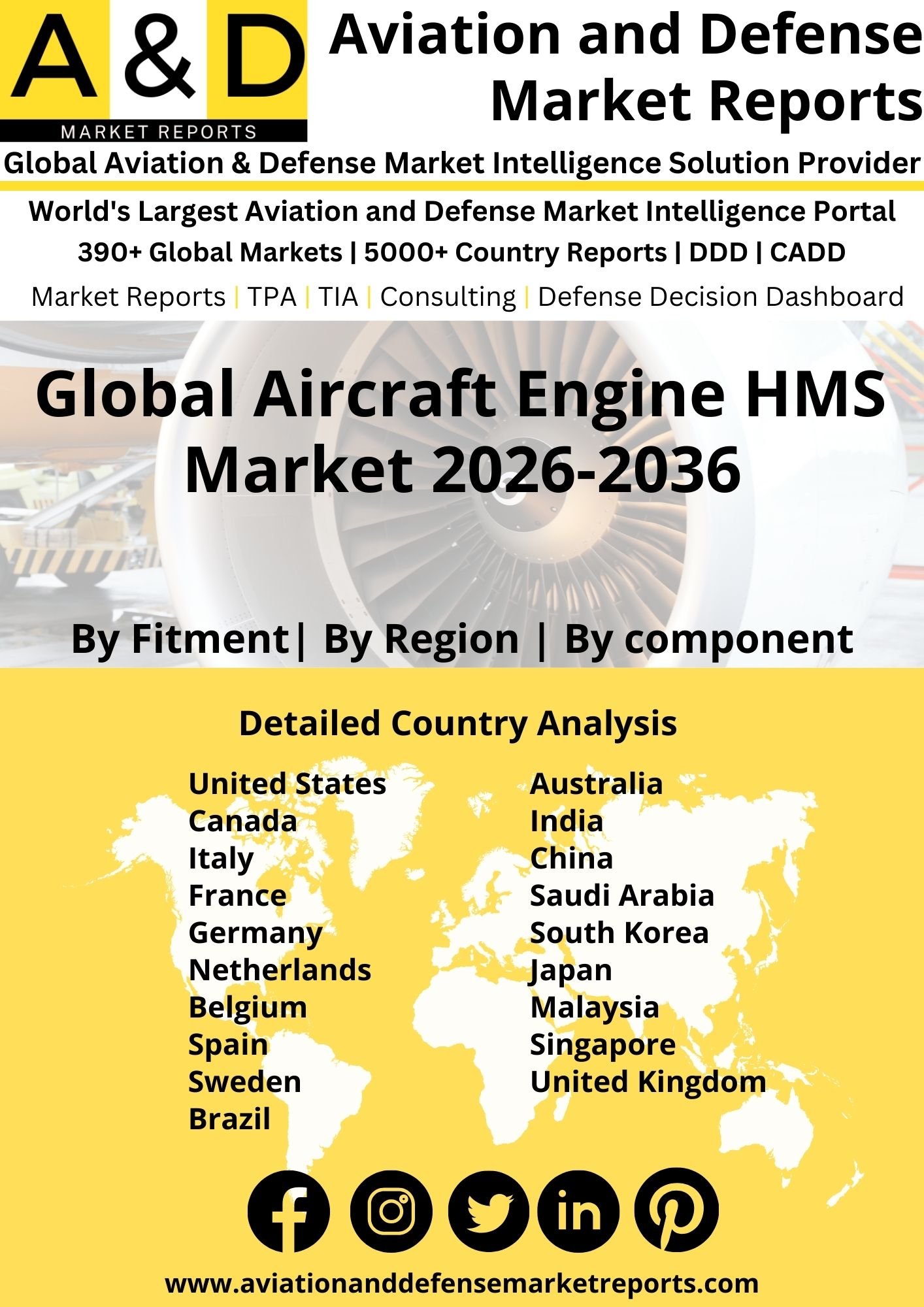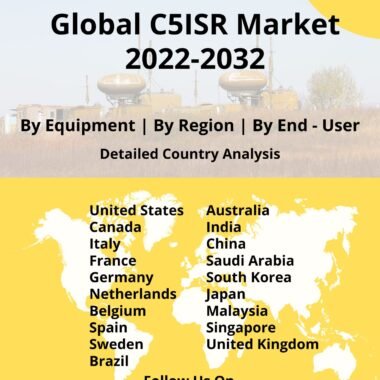Description
Aircraft Engine HMS Market
Frequently Asked Questions of Aircraft Engine HMS Market
An aircraft engine health monitoring system (EHMS), also known as an engine condition monitoring system (ECMS) or engine health and trend monitoring (EHTM), is a sophisticated technology used to monitor and assess the performance and health of aircraft engines. It utilizes sensors, data analysis algorithms, and advanced software to collect, analyze, and interpret data from the engine during flight operations. The primary objectives of an aircraft engine health monitoring system are to ensure the safe and efficient operation of the engine, optimize maintenance schedules, and prevent unscheduled engine failures.
Sensors and probes are installed on various engine components to measure parameters such as temperature, pressure, vibration, fuel flow, and rotational speed. These sensors continuously collect data during engine operation. The collected data is processed and analyzed by specialized software algorithms. These algorithms compare the real-time engine data with predefined thresholds, performance models, and historical trends to identify deviations, abnormalities, or potential issues. The engine health monitoring system tracks engine performance parameters, such as thrust, fuel consumption, exhaust gas temperature, and other key indicators. It identifies any variations or trends that may indicate a deterioration in engine performance. The system’s algorithms and data analysis techniques can detect anomalies, faults, or malfunctions in engine components. It alerts maintenance personnel or flight crews about potential issues, allowing them to take appropriate actions or initiate maintenance procedures.
The system tracks the long-term performance trends of the engine, providing insights into the engine’s overall health and degradation over time. It helps identify patterns or changes in performance that may require proactive maintenance actions. By continuously monitoring the engine’s health and performance, the system enables predictive maintenance practices. It can generate maintenance alerts or recommendations based on the engine’s condition, allowing maintenance personnel to plan and schedule maintenance tasks more efficiently. Data Visualization and Reporting system provides visual representations of engine data, performance trends, and alerts through user-friendly interfaces. It generates reports and summaries that assist maintenance crews and operators in understanding the engine’s health and making informed decisions.
Major factors driving Aircraft-Engine HMS Market Growth
Airports are under constant pressure to optimize their operations and reduce costs. Smart airports offer technologies and solutions that improve processes such as passenger check-in, security screening, baggage handling, and aircraft operations, leading to increased efficiency and productivity.
Trends influencing the Aircraft Engine HMS Market Size
Advancements in sensor technology have led to the development of more robust and accurate sensors for monitoring engine parameters. These sensors can measure various parameters such as temperature, pressure, vibration, and oil quality with greater precision and reliability, providing more accurate data for analysis. Engine health monitoring systems now leverage big data and advanced analytics techniques to process and analyze large volumes of engine data. This enables more sophisticated algorithms and models to detect subtle variations, patterns, and anomalies in engine performance, contributing to enhanced predictive capabilities.
Aircraft Engine HMS Market Forecast & Dynamics
Advancements in aircraft engine health monitoring systems market trends enhance the ability to monitor engine health in real time, predict potential failures, optimize maintenance practices, and improve operational efficiency. They contribute to increased safety, reduced maintenance costs, and enhanced aircraft availability, ultimately benefiting both airlines and passengers. Continued research and development in this field are expected to further enhance the capabilities and effectiveness of engine health monitoring systems. The aircraft engine Health Monitoring Systems market forecast includes a comprehensive market analysis and aircraft engine Health Monitoring Systems market size. The market analysis includes regional market size, drivers, restraints, and opportunities. The regional analysis also includes country-wise market size.
Aircraft Engine HMS Market Analysis for Recent Developments
Columbia Helicopters (HELI-EXPO Booth #B6427) and GPMS International (Booth #B3214) today signed an agreement to develop a Supplemental Type Certificate (STC) for the Columbia Model 234 Multi-Mission Chinook and the CH-47 helicopter to operate the GPMS Foresight MX predictive Health and Usage Monitoring System (HUMS), including the shipset and related services. Foresight MX from GPMS allows helicopter operators to remotely monitor fleet health from a single user-friendly interface. Smart sensors in Foresight detect when crucial components are beginning to wear, and prognostic algorithms indicate when maintenance may be required. GPMS’s enhanced HUMS tracks flight data, exceedances, and directs rotor track and balance in addition to mechanical and engine health monitoring, offering maintainers the ability to analyse, predict, and perform.
The engines of the Navy’s fleet of MiG-29K fighter jets will soon be maintained using artificial intelligence (AI).The health utilisation and monitoring system will leverage AI to reduce the time required for data analysis, leading in faster aircraft turnaround and improved preventive maintenance projections. The AI-based programme has been included in the “launch of new technology” by the Defence Research and Development Organisation (DRDO).
The global landscape of aircraft engine Health Monitoring Systems market report (HMS) has evolved to enhance the reliability, efficiency, and safety of aviation. HMS, also known as Engine Condition Monitoring (ECM) systems, utilizes advanced sensors, data analytics, and connectivity to continuously monitor the health and performance of aircraft engines. Advancements in sensor technologies and data analytics algorithms enable real-time monitoring of critical engine parameters, facilitating the early detection of potential issues. This predictive maintenance approach helps airlines optimize maintenance schedules, reduce downtime, and enhance overall fleet reliability.
Integration of artificial intelligence and machine learning in aircraft engine Health Monitoring Systems market analysis enables more accurate fault prediction and trend analysis, improving the system’s ability to identify subtle changes in engine behavior that may indicate developing issues. Connectivity improvements, including satellite communication and ground-based networks, enhance the transmission of real-time engine health data to maintenance centers. This connectivity facilitates proactive decision-making, remote diagnostics, and efficient coordination of maintenance activities. Global standardization efforts and collaboration between aviation stakeholders contribute to the widespread adoption of HMS across different aircraft types and manufacturers. The continued evolution of Aircraft Engine HMS market growth in 2023 reflects a commitment to advancing aviation safety and operational efficiency through data-driven predictive maintenance strategies.





